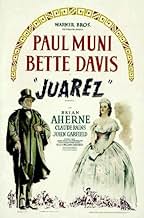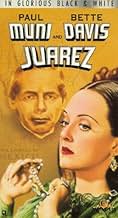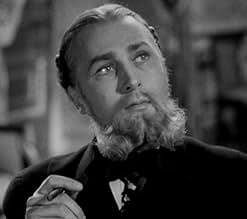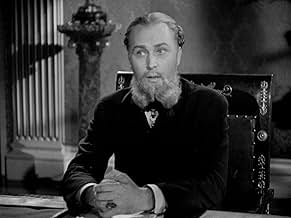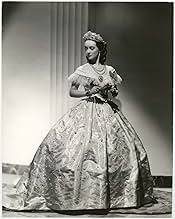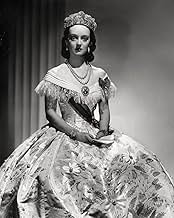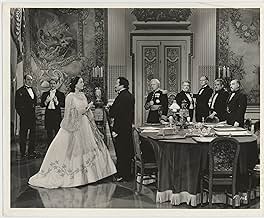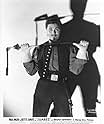Juarez
- 1939
- Tous publics
- 2h 5min
NOTE IMDb
6,9/10
2,7 k
MA NOTE
Louis Napoléon III profite de la guerre civile américaine pour contourner la doctrine Monroe et étendre son pouvoir en aidant l'empereur Maximilian Habsbourg à ajouter le Mexique à son empir... Tout lireLouis Napoléon III profite de la guerre civile américaine pour contourner la doctrine Monroe et étendre son pouvoir en aidant l'empereur Maximilian Habsbourg à ajouter le Mexique à son empire.Louis Napoléon III profite de la guerre civile américaine pour contourner la doctrine Monroe et étendre son pouvoir en aidant l'empereur Maximilian Habsbourg à ajouter le Mexique à son empire.
- Réalisation
- Scénario
- Casting principal
- Nommé pour 1 Oscar
- 3 victoires et 1 nomination au total
Avis à la une
JUAREZ, despite playing fast and loose with certain historical facts, is nevertheless rousing and sumptuous epic film-making about the struggle for justice - on the one hand by the Mexican people and on the other by their hapless monarch.
The people are represented by Paul Muni impersonating Mexican president Benito Juarez; his expressionless face and slow, monotonous line readings are almost laughable; he comes across as a sort of Unconquerable Zombie of the People. He almost always appears in the same frame as a portrait of his hero and contemporary, Abraham Lincoln. As others have pointed out, his most powerful moment comes when he walks purposefully toward a line of armed soldiers in one of those moments of truth at the core of all successful revolutions: the refusal of the armed forces to defend the established regime.
The hounded monarch, Archduke Maximilian, is played by Brian Aherne in what may well be the best casting he was ever assigned on film. His performance is letter perfect as the idealistic puppet of Napoleon III who stuck to his outmoded principles despite overwhelming odds in much the same way as Nicholas II did in Russia decades later. In another parallel to the later Russian events, his domineering wife Carlotta (played by a beautifully photographed, no-holds-barred, black-bewigged Bette Davis) takes matters into her own hands to support his flimsy but ardent claim to the leadership of the country; Aherne, like Muni, is also frequently seen in proximity to a framed portrait - of his wife.
This is an expensive production with lavish costumes, stunning set pieces, gorgeous music, literate dialogue, a who's who of excellent supporting players, and breathtaking photography (the latter by veteran cameraman Tonio Gaudio, some of whose visions, especially Carlotta's prayer to the Virgin Mary and her final scene in a sunlit chamber, recall the most ethereal imagery of the silent era). All of these elements work together to get our blood surging in sympathy for the downtrodden Mexican peasantry as they rise up against cold hearted official corruption. And on a smaller level we feel equally moved by the personal plight of Maximilian.
With so much stuffing, not everything works perfectly. John Garfield, one of the best film actors of his time, is unconvincing as a Mexican general. There is a problem with pacing and informational overkill. Muni's sleepwalking performance contributes to a sense of sluggishness. Whenever he appears you brace yourself for a plodding and profound dose of Great Truth. At least these Truths are not banalities, so they are somewhat worth waiting for.
The people are represented by Paul Muni impersonating Mexican president Benito Juarez; his expressionless face and slow, monotonous line readings are almost laughable; he comes across as a sort of Unconquerable Zombie of the People. He almost always appears in the same frame as a portrait of his hero and contemporary, Abraham Lincoln. As others have pointed out, his most powerful moment comes when he walks purposefully toward a line of armed soldiers in one of those moments of truth at the core of all successful revolutions: the refusal of the armed forces to defend the established regime.
The hounded monarch, Archduke Maximilian, is played by Brian Aherne in what may well be the best casting he was ever assigned on film. His performance is letter perfect as the idealistic puppet of Napoleon III who stuck to his outmoded principles despite overwhelming odds in much the same way as Nicholas II did in Russia decades later. In another parallel to the later Russian events, his domineering wife Carlotta (played by a beautifully photographed, no-holds-barred, black-bewigged Bette Davis) takes matters into her own hands to support his flimsy but ardent claim to the leadership of the country; Aherne, like Muni, is also frequently seen in proximity to a framed portrait - of his wife.
This is an expensive production with lavish costumes, stunning set pieces, gorgeous music, literate dialogue, a who's who of excellent supporting players, and breathtaking photography (the latter by veteran cameraman Tonio Gaudio, some of whose visions, especially Carlotta's prayer to the Virgin Mary and her final scene in a sunlit chamber, recall the most ethereal imagery of the silent era). All of these elements work together to get our blood surging in sympathy for the downtrodden Mexican peasantry as they rise up against cold hearted official corruption. And on a smaller level we feel equally moved by the personal plight of Maximilian.
With so much stuffing, not everything works perfectly. John Garfield, one of the best film actors of his time, is unconvincing as a Mexican general. There is a problem with pacing and informational overkill. Muni's sleepwalking performance contributes to a sense of sluggishness. Whenever he appears you brace yourself for a plodding and profound dose of Great Truth. At least these Truths are not banalities, so they are somewhat worth waiting for.
Well appointed but lumbering, miscast drama. Bette is fine, all spit and fire but John Garfield, who was embarrassed by his forced casting, is completely out of place as Porfirio Diaz with his New York accent still firmly in place. Paul Muni, a very fine actor in modern dress roles, does what he always does when heavily made up; he lets the makeup do the acting for him. The best performance is delivered by Brian Aherne but he is hampered by a bizarre beard which distracts the viewer whenever he's on screen. The lack of fluid direction makes this feel more like a history lesson than a dramatized story of an actual series of events. A good try but stodgy.
Although there are some mistakes historically speaking,this is an absorbing screenplay,with superlative performances by Paul Muni,Bette Davis and Brian Aherne,who should have been at the top of the bill too,for he has more scenes than his two co-stars.
Muni is almost frightening with his impassive face and his slow delivery.If looks could kill,his certainly would...
Davis ,although she does not look like Charlotte physically ,gives a captivating portrayal of the empress.The scene when she prays Virgin Mary is impressive ,but not true: she was not sterile,but she and the emperor used to sleep apart!Their relationship was much more complex than the one depicted by Dieterlé: actually,the emperor was often away,it seemed that their strange love worked from a distance.Little by little,Maximilian lost all interest in power and Charlotte was ruling while he was gone (which often happened)or was staying in his Cuernavaca "paradise" .
Aherne is Maximilian in the flesh.It's interesting to notice that his brother Francis-Joseph had deprived him of all his rights and his titles in Austria.Historians generally agree that he would not have accepted the Mexican throne,if Charlotte had not been his wife. the problem is that the film doesn't show us the couple BEFORE they get to Mexico:one thing to bear in mind is that Max did not accept the throne overnight;and many people in Europa (notably Queen Victoria and Empress Elizabeth aka "Sissi" ) had warned them it was more a curse than a blessing.Charlotte (Carlotta) ,someone reportedly said ,wanted to reign over any people anywhere.Sissi called her Max's black angel. Maximilian is depicted as a chivalrous noble sovereign which he was in a way.But of course ,he had lots of (Mexican)lovers since he didn't sleep with his wife
Dieterlé does not pass over in silence the obnoxious role played by Napoleon the Third (and wife Eugénie de Montijo).Charlotte does show her contempt:"He is an impostor,his family is not an old one like ours ".The famous scene of the orangeade is included .Today,no serious historian would put forward that the drink was poisoned.But it might be possible that she was poisoned before leaving Mexico.Davis shines when she plays these scenes of madness.The scenes in Paris are not thoroughly accurate though:Eugenie (an incredibly beautiful Sondergaard) met first Carlotta alone in the Grand Hotel -they did not invite her to the Tuileries,which meant a lot about what they felt-Metternich was not the person who helped Carlotta :she first took refuge in the Vatican where the pope had trouble to get rid of her,then her sister-in-law Marie -Henriette ,queen of Belgium,came to her rescue when she was treated almost like a prisoner in Miramar.
All that concerns Maximilian's death is accurate ,his last words were "poor Charlotte!"
Poor Charlotte indeed.She was to outlive almost everyone,even Empress Eugenie! She died in 1927,after years and years of insanity with occasional moments of lucidity ,notably during WW1.
Dieterlé's movie is by no means uninteresting,but it would be exciting to film a remake in the light of the recent works about the Mexican adventure.
Muni is almost frightening with his impassive face and his slow delivery.If looks could kill,his certainly would...
Davis ,although she does not look like Charlotte physically ,gives a captivating portrayal of the empress.The scene when she prays Virgin Mary is impressive ,but not true: she was not sterile,but she and the emperor used to sleep apart!Their relationship was much more complex than the one depicted by Dieterlé: actually,the emperor was often away,it seemed that their strange love worked from a distance.Little by little,Maximilian lost all interest in power and Charlotte was ruling while he was gone (which often happened)or was staying in his Cuernavaca "paradise" .
Aherne is Maximilian in the flesh.It's interesting to notice that his brother Francis-Joseph had deprived him of all his rights and his titles in Austria.Historians generally agree that he would not have accepted the Mexican throne,if Charlotte had not been his wife. the problem is that the film doesn't show us the couple BEFORE they get to Mexico:one thing to bear in mind is that Max did not accept the throne overnight;and many people in Europa (notably Queen Victoria and Empress Elizabeth aka "Sissi" ) had warned them it was more a curse than a blessing.Charlotte (Carlotta) ,someone reportedly said ,wanted to reign over any people anywhere.Sissi called her Max's black angel. Maximilian is depicted as a chivalrous noble sovereign which he was in a way.But of course ,he had lots of (Mexican)lovers since he didn't sleep with his wife
Dieterlé does not pass over in silence the obnoxious role played by Napoleon the Third (and wife Eugénie de Montijo).Charlotte does show her contempt:"He is an impostor,his family is not an old one like ours ".The famous scene of the orangeade is included .Today,no serious historian would put forward that the drink was poisoned.But it might be possible that she was poisoned before leaving Mexico.Davis shines when she plays these scenes of madness.The scenes in Paris are not thoroughly accurate though:Eugenie (an incredibly beautiful Sondergaard) met first Carlotta alone in the Grand Hotel -they did not invite her to the Tuileries,which meant a lot about what they felt-Metternich was not the person who helped Carlotta :she first took refuge in the Vatican where the pope had trouble to get rid of her,then her sister-in-law Marie -Henriette ,queen of Belgium,came to her rescue when she was treated almost like a prisoner in Miramar.
All that concerns Maximilian's death is accurate ,his last words were "poor Charlotte!"
Poor Charlotte indeed.She was to outlive almost everyone,even Empress Eugenie! She died in 1927,after years and years of insanity with occasional moments of lucidity ,notably during WW1.
Dieterlé's movie is by no means uninteresting,but it would be exciting to film a remake in the light of the recent works about the Mexican adventure.
From "Pancho Villa Starring Himself" to "The Mexican" and the execrable "Man on Fire" (produced by an Englishman, from an Italian script loosely based on an incident in Columbia... reset in Mexico), Hollywood has never made a film about Mexico that doesn't fall back on clichés and cartoonish "gringo-centric" stereotypes. Despite some problems, Juarez is an honorable exception.
The problem with the screenplay is that Bettina Harding bought the romantic, Euro-centric notion of Max and Carlotta as figures in a "tragic romance". They were patsies for Napoleon III's global ambitions (something the film does very well), but everyone in Mexico knows the two were complete fools who destroyed the economy, and hardly the loving couple depicted in the movie. Max was a syphilitic, pretentious twit. He neglected Carlotta (the "Casa Obvio", his summer house in Cuernavaca that he built, "forgetting" to include rooms for Carlotta is a popular tourist attraction now, and a botanical museum), had a son by his mistress, "la Bonita India" and -- infected his wife.
The other reviewer is unintentionally misleading when he writes that Carlotta lived in seclusion for 60 years. She was bed-ridden most of the time, suffering tertiary syphilis, requiring round-the-clock medical care. She did indeed, like in the film, go bonkers -- but in the Vatican, not in a French palace. The Papacy was a major player in the geo-politics surrounding the Mexican adventure, but the film (perhaps wisely) simplifies the politics.
But, what the hey -- it's Hollywood! It has the perfect cast for this kind of epic: who better to play stoic, long-suffering historical figures than Paul Muni? Who does devious Europeans better than Claude Raines and Donald Crisp? I really enjoy seeing Porfirio Diaz (who later seized the Mexican presidency in a coup, and maintained control for close to 35 years -- and is now a mixed figure in Mexican history, sort of like Lenin with the Russians, or Ataturk among the Turks) played by John Garfield. And who better to go completely bonkers and chew up the scenery than Bette Davis? By all means, watch the movie, but then read your Mexican history.
The problem with the screenplay is that Bettina Harding bought the romantic, Euro-centric notion of Max and Carlotta as figures in a "tragic romance". They were patsies for Napoleon III's global ambitions (something the film does very well), but everyone in Mexico knows the two were complete fools who destroyed the economy, and hardly the loving couple depicted in the movie. Max was a syphilitic, pretentious twit. He neglected Carlotta (the "Casa Obvio", his summer house in Cuernavaca that he built, "forgetting" to include rooms for Carlotta is a popular tourist attraction now, and a botanical museum), had a son by his mistress, "la Bonita India" and -- infected his wife.
The other reviewer is unintentionally misleading when he writes that Carlotta lived in seclusion for 60 years. She was bed-ridden most of the time, suffering tertiary syphilis, requiring round-the-clock medical care. She did indeed, like in the film, go bonkers -- but in the Vatican, not in a French palace. The Papacy was a major player in the geo-politics surrounding the Mexican adventure, but the film (perhaps wisely) simplifies the politics.
But, what the hey -- it's Hollywood! It has the perfect cast for this kind of epic: who better to play stoic, long-suffering historical figures than Paul Muni? Who does devious Europeans better than Claude Raines and Donald Crisp? I really enjoy seeing Porfirio Diaz (who later seized the Mexican presidency in a coup, and maintained control for close to 35 years -- and is now a mixed figure in Mexican history, sort of like Lenin with the Russians, or Ataturk among the Turks) played by John Garfield. And who better to go completely bonkers and chew up the scenery than Bette Davis? By all means, watch the movie, but then read your Mexican history.
An amazing conflagration of actors populates the cast of 1939's "Juarez" -- Brian Aherne, Paul Muni, Bette Davis, Claude Rains, John Garfield, Gale Sondergaard, Donald Crisp, Gilbert Roland, and Louis Calhern. More amazing is the size of many of their roles - small! It shows that Warner Brothers put everything behind this epic film.
The story concerns the short reign of Maximilian von Hapsburg (Aherne) as Emperor of Mexico, seduced into taking the position by Napoleon III (Rains) who convinces him that the Mexican people want a monarchy. They don't. Opposing Maximilian is the man of the people, Benito Juarez (Muni), who has the support of the United States. Both Maximilian and Juarez want many of the same things, but Maximilian's hard work to unite the Mexican people and stop the fighting fails.
Though the title is "Juarez," the workhorse role belongs to the underrated Brian Aherne, an excellent actor from the theater who took second place to Errol Flynn at Warner Brothers. Though superstardom eluded him, he was a brilliant actor and a handsome man who turned in many great performances during a 43-year career. His Maximilian is gentle, likable, strong, and sympathetic. He gets third billing to Muni and Davis. Davis plays the Empress Carlota, Maximilian's wife. It's a secondary role but she has a huge, dramatic scene when Carlota returns to France to insist that Napoleon III keep his troops in Mexico. One of the best moments in the film is Carlota, going mad and believing the French court is trying to poison her, running out into the night, her white dress slowly disappearing. Davis wears magnificent gowns and has dark hair that seems to emphasize her huge eyes even more. She looks quite beautiful and gives a solid performance as a fragile woman devoted to her husband.
Paul Muni's Juarez is stiff, and he looks and acts as if he's embalmed. Muni was a great actor who delved deeply into his roles, and it's not clear what he was thinking when he gave this performance. Undoubtedly he had researched Benito Juarez to the ground and was giving an exact representation of him. But as Bette Davis once said, "True acting is larger than life." Muni needed something more for this role but doesn't supply it. John Garfield's Porfirio Diaz is odd casting. He makes a little attempt at an accent; underneath that dark makeup is still John Garfield. Supposedly his role was cut down. Back in 1939, audiences were just getting to know him, so his performance probably held up well back then. Nowadays one only thinks, "Why is John Garfield playing a Mexican?" "Juarez" is rich in detail - it occasionally is plodding and runs a bit long in an effort to supply the historic happenings. But it is well worth seeing for the performances, the story, and those Orry-Kelly gowns.
The story concerns the short reign of Maximilian von Hapsburg (Aherne) as Emperor of Mexico, seduced into taking the position by Napoleon III (Rains) who convinces him that the Mexican people want a monarchy. They don't. Opposing Maximilian is the man of the people, Benito Juarez (Muni), who has the support of the United States. Both Maximilian and Juarez want many of the same things, but Maximilian's hard work to unite the Mexican people and stop the fighting fails.
Though the title is "Juarez," the workhorse role belongs to the underrated Brian Aherne, an excellent actor from the theater who took second place to Errol Flynn at Warner Brothers. Though superstardom eluded him, he was a brilliant actor and a handsome man who turned in many great performances during a 43-year career. His Maximilian is gentle, likable, strong, and sympathetic. He gets third billing to Muni and Davis. Davis plays the Empress Carlota, Maximilian's wife. It's a secondary role but she has a huge, dramatic scene when Carlota returns to France to insist that Napoleon III keep his troops in Mexico. One of the best moments in the film is Carlota, going mad and believing the French court is trying to poison her, running out into the night, her white dress slowly disappearing. Davis wears magnificent gowns and has dark hair that seems to emphasize her huge eyes even more. She looks quite beautiful and gives a solid performance as a fragile woman devoted to her husband.
Paul Muni's Juarez is stiff, and he looks and acts as if he's embalmed. Muni was a great actor who delved deeply into his roles, and it's not clear what he was thinking when he gave this performance. Undoubtedly he had researched Benito Juarez to the ground and was giving an exact representation of him. But as Bette Davis once said, "True acting is larger than life." Muni needed something more for this role but doesn't supply it. John Garfield's Porfirio Diaz is odd casting. He makes a little attempt at an accent; underneath that dark makeup is still John Garfield. Supposedly his role was cut down. Back in 1939, audiences were just getting to know him, so his performance probably held up well back then. Nowadays one only thinks, "Why is John Garfield playing a Mexican?" "Juarez" is rich in detail - it occasionally is plodding and runs a bit long in an effort to supply the historic happenings. But it is well worth seeing for the performances, the story, and those Orry-Kelly gowns.
Le saviez-vous
- AnecdotesBecause the film shows a number of Maximilian's generals to be Mexican, many viewers attribute it to typical Hollywood historical distortions. It is, however, indeed accurate. It's a little-known fact that, although Maximilian was eventually overthrown and executed by Mexican revolutionaries, there were more Mexicans fighting on Maximilian's side than against him. This was due in large part to the Catholic Church's strong support of the French occupation of Mexico and its encouraging of Mexican Catholics to fight against the revolutionary forces by joining Maximilian's army, which they did in large numbers.
- GaffesWhen Napoleon III is informed in a letter that Robert E. Lee has been defeated at Gettysburg, he responds by paraphrasing Lincoln's famous Gettysburg Address by calling democracy as government for the people, by the people, etc. He couldn't have known Lincoln's speech flourish because it wasn't given until November 19, 1863, more than four months after the battle.
- Citations
Emperor Louis Napoleon III: Democracy! Government of the cattle, by the cattle, for the cattle!
- Versions alternativesIn 1952, the film was re-released and several key scenes were removed, particularly sequences that contained dialogue that criticized countries which, in 1939 had been regarded as totalitarian, but which, by the early 1950s had become Cold War allies of the United States and could therefore no longer be criticized as imperialist adventurers. Germany and Italy, especially, former enemies in the 1940s, were now the cornerstone of NATO. The removal of these scenes obfuscated the narrative considerably, in particular, removing any clear reasons behind the execution of the Emperor Maximilian at the conclusion of the film. This revised print runs 106 minutes and is the version released on video and generally available today. The 1939 version is preserved on nitrate stock in the Warner Archive.
- ConnexionsFeatured in Hollywood and the Stars: The Angry Screen (1964)
- Bandes originalesMy Country Tis of Thee
(uncredited)
Music attributed to Henry Carey (1744)
Played as part of the score when America is mentioned
Meilleurs choix
Connectez-vous pour évaluer et suivre la liste de favoris afin de recevoir des recommandations personnalisées
- How long is Juarez?Alimenté par Alexa
Détails
- Durée
- 2h 5min(125 min)
- Couleur
- Mixage
- Rapport de forme
- 1.37 : 1
Contribuer à cette page
Suggérer une modification ou ajouter du contenu manquant


